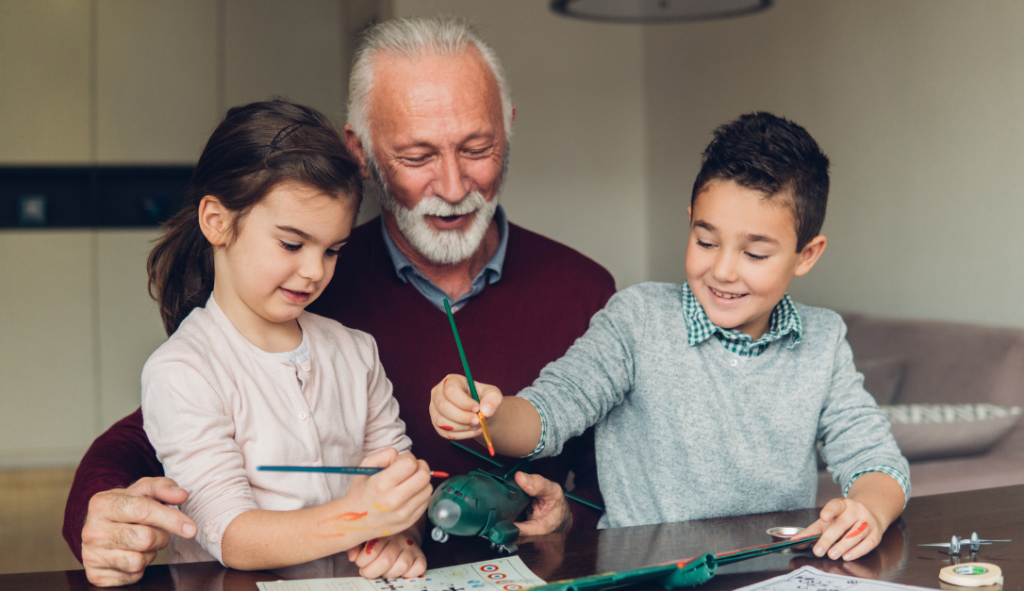Grandparents with Alzheimer’s or another kind of dementia are more likely to have grandkids who are also suffering from memory loss. With dementia, family dynamics may be dramatically altered, especially the bond between grandparents and grandchildren.
While engaged grandparents play a strong, beneficial influence in their grandchildren’s lives, we often overlook the importance that grandkids play in their proud grandparents’ lives. A growing body of research shows connections between generations may have a positive impact on health.
Keeping grandkids informed about the changes in their grandparents’ behavior and memory is critical for families of elders with Alzheimer’s or another form of dementia.
When caring for a grandmother with dementia, adult children may lose sight of how their children are impacted. In the absence of knowledge, children may be more scared and emotionally disturbed by their grandparent’s change in personality.
Helping grandchildren cope with their grandparent’s cognitive changes may be as simple as comforting them and letting them know it’s okay to feel sad or angry.
Families with dementia should prioritize the needs of their grandchildren by spending time with them, allowing them to participate in activities, and reducing the amount of time the grandchildren are required to provide care for the dementia patient. Families should encourage activities such as arts and crafts, singing or listening to music, looking at picture albums, and even performing domestic tasks for grandparents with Alzheimer’s and their grandchildren.
When a grandmother has dementia and lives with the children, parents should prioritize the needs of the children by spending time with them, allowing them to continue participating in activities and reducing the amount of time the children have to provide supervision for the person with dementia.
While dealing with caregiving responsibilities, adult children may lose sight of how their children are impacted by a grandparent’s dementia, says Haynes. In the absence of knowledge, children may be more scared and emotionally disturbed by their grandparent’s change in personality. “Parents may be uncertain of how to explain their grandparent’s illness, but silence is the worst strategy.
Alzheimer’s and dementia patients and their families may benefit from Right at Home’s Dementia and Cognitive Support Program thanks to its person-centered approach. Every individual, no matter how far along in their illness they may be, can be present and aware of their environment, which is the program’s cornerstone. Right at Home works with families to develop a personalized care plan that takes into account the individual’s personal history, habits, and preferences, and then incorporates activities that promote nutrition, sociability, awareness, and overall well-being.
A good opportunity to celebrate grandparents who give their grandchildren unconditional love, provide wisdom, and assist stressed-out parents, according to Haynes, is on World Alzheimer’s Day. We should put more effort into teaching dementia while we’re at it.
How to deal with this situation?
When a grandparent has dementia and lives with the children, parents should prioritize the needs of the children by spending time with them, allowing them to continue participating in activities and reducing the amount of time the children have to provide supervision for the person with dementia. The assistance of an adult day center or in-home care providers may be beneficial.
As a result, today’s grandchildren are a bit older than those from earlier generations. As the number one cause of Alzheimer’s disease and other forms of dementia becomes older, more grandkids will have grandparents who are suffering from cognitive impairment. With dementia, connections within a family may be irreparably strained, especially those between grandparents and their grandchildren.
Some parents get so preoccupied with caring that they fail to see how their children are being impacted by a loved one’s dementia. Without knowledge, children may be more scared and emotionally disturbed by changes in their grandparent’s behavior or memory. Silence is the worst possible strategy to adopt in this situation. If you have children, the National Institute on Aging recommends that you be honest with them about your grandparent’s condition. Help your children cope with their emotions by reassuring them that sorrow and rage are natural with dementia.
Conclusion:
Children are the leaders of tomorrow. An education program for youngsters with this message content may be crucial in eradicating the stigma associated with dementia and creating dementia-friendly neighborhoods and cities.

